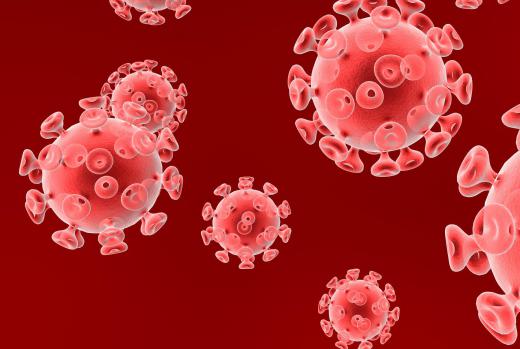What is Virology?
 Mary McMahon
Mary McMahon
Virology is a branch of the sciences which focuses on the study of viruses and organisms which behave like viruses, such as prions and viroids. Researchers in this field can work with viruses which attack plants, animals, or bacteria, conducting research both in the lab and in the field. Many governments invest heavily in virology to address issues which relate to public health, and private drug companies and research institutions are also interested in virology and its applications.
One of the primary goals of virology is classification, in which viruses are studied to determine what they are and how they work. Classification can be used to determine that various viruses are related to each other, and that they may therefore work in the same way, or be vulnerable to the same antiviral drugs. Being able to classify viruses also allows researchers to determine if the virus has been seen before, and to link the viruses they find with existing studies and information.

Virologists also are concerned with the structure of viruses, and the way in which viruses work. Though not considered living organisms, viruses can be quite complex, and they have adapted a number of clever tricks, like hijacking cells and getting them to reproduce the virus or tricking the body into thinking that a viral agent is not an unwanted invader. Understanding how these organisms work can be an important part of developing methods which can be used to eradicate them.

Viral diseases, the outcome of viral infection, are also of interest to virologists, along with modes of transmission and related topics. When outbreaks of viruses occur, researchers conduct research to determine where the virus came from, how it can be treated, what the symptoms are, and how additional infections might be prevented. Virologists also track long term trends, such as changes in viral DNA, or alterations in immunity levels in populations which are at risk of infection.

Virologists work to develop drugs which can be used in the treatment of viral infections, and they also develop vaccines, in which small amounts of antigens are introduced into the body to stimulate it into producing antibodies which will defend it in the event of viral exposure. Some viruses remain relatively static, allowing researchers to rely on the same vaccine year after year, while others quickly mutate and change, requiring the development of new vaccines and drugs so that the medical and virology community can stay ahead.
AS FEATURED ON:
AS FEATURED ON:




















Discussion Comments
@whiteplane - It is always hard to say what is the "best" especially when it comes to med schools. But one metric you can go by is to look at which programs have been awarded the most NIH grants. For a lot of reasons, the amount of these awards reflects on the quality of the institution. Currently Harvard receives the most money with Baylor not far behind. Its probably safe to say that these are both great schools with some of the best virology courses around
Does anybody know where the best virology graduate program is?
Virology sounds like a really important field. Think of how many people get the flu each year. And then think about how many various vaccines are administered each year. Virologists work in both of these fields. Their work is right at the center of some of the most important medicine there is.
I think its really interesting to think about virologists trying to classify the various viruses they encounter. I'm sure that there is a lot of complicated science involved, but at the heart of this study is the simple act of comparing something new to what has come before. There is probably a lot of trial and error involved.
There are some who worry that the end of the world, or at least our species, will come in the form of a super flu. Flu, of course, is a virus and virologists have studied the possibility of a flu epidemic intensely.
I think there is real cause for concern. We have seen already how flu and other viruses can spread and grow beyond the means of science. I hope that research into this problem continues to get the funding and attention that it deserves, because if that day ever comes, I can tell you, the virologists could literally save the world.
Post your comments